#i’m literally so so normal about the evolution of them as individuals and as pairs
Note
You talk a lot about how the Digimon are born from the kids own souls, would you be interested into describing how the digimon partners reflect their humans' personalities?
Oh man, I love this topic! (You’ll have to forgive me in that my desire to do justice for it is why it ended up taking me this long to answer it.)
The part about the Digimon literally being part of the kids’ souls comes directly from official (it’s been mentioned several times, not only in what I just linked). This was never stated outright in the original Adventure or 02, and it took until Kizuna to really shove the link between the partner and the human’s inner self in your face and make it a huge part of the actual story, but fans had been catching onto it long before that, and even without reading what the staff had said. Kizuna throws a bit of a nail in this because it’s said to be a bit lore-noncompliant, but considering how much of the background lore it still goes out of its way to adhere to, and the fact it still does match the fundamental concept of “human heart = Digimon partner” regardless of detailed minutiae, we can still apply and analyze this concept with no problem, especially since Adventure and 02 always walked the line between sci-fi and fantasy, and there is undoubtedly a spiritual element to them no matter how you look at it.
(My personal comfort zone in analyzing Adventure and 02 comes moreso from a human behavior and mentality perspective, which is also why my meta on this blog tends to focus more on the human drama aspects of Adventure and 02 and especially the latter’s story being so heavily about human relationships, but if you’re interested in said spiritual elements, I heavily recommend @analyzingadventure‘s very comprehensive meta on Adventure background lore and themes, which also covers similar territory in detail. We’re different people, so our takes on it probably differ in some respects, but that’s the beauty of having different perspectives, after all.)
In any case, back to your question. I think it would be best to break this down piece-by-piece with the Adventure and 02 kids in detail, so more is under the cut!
...Well, okay, before we continue, I do want to touch on something briefly, and it’s regarding the fact that “evolution” in this series is generally a metaphor for human growth. That counts for when everyone gets their evolutions, but it also counts as a metaphor overall -- after all, Adventure is about self-assertion and pushing oneself as far as possible (the major evolution gimmick being tied to Crests), whereas 02 is about cultivating differing aspects of yourself and applying it to how you form relationships with others (the major evolution gimmick being tied to Digimentals and ultimately Jogress). The human self is quite a flexible thing, and the Digimon themselves quite often change personalities as they evolve. (I touched on this briefly in my discussion of honorfiics and first-person pronouns earlier, but in Japanese, the Digimon will often even change personalities and speech patterns as they evolve.) This also leads to a few other potential observations (not really corroborated by official, just my personal view of it):
Speaking from a meta perspective, the fact that only the “front protagonists” end up getting the highest level forms is pretty obviously so they don’t have to spend toy budget on allocating it to everyone, but from an in-story perspective, Adventure episode 50 adds an implication that not reaching as high of a form may also have to do with how inherently attuned one is to combat (Jou says that he believes that Gomamon will never reach Ultimate because he doesn’t have the sort of strength Taichi and Yamato do, and it contributes to his conclusion that his skills are more meaningfully applied as a healer instead of as a fighter). Of course, none of the Adventure or 02 cast is necessarily the belligerent type that inherently likes fighting in itself, but of course certain ones are less emotionally drained or more attuned to it, so you might be able to see a rough pattern there. (Again, I’m not going to sugarcoat how this still has a lot of dismaying issues on the meta level, but the difference between “how much this sucks on a meta level” and “whether this at least tracks in-story” is a common theme on this blog.) In a franchise sense, Digimon were of course conceptualized as fighting monsters, but within the narrative of Adventure, it probably stands to reason that having a manifested part of your soul or inner self shouldn’t necessarily mean they have to be fighting things all of the time unless it’s necessary.
It’s very often been pointed out that the 02 cast is at a sort of “combat disadvantage” compared to their seniors (well, and Takeru and Hikari, anyway) because their highest forms require two people/Digimon to be in play, so their overall combat power is rather low. My impression is that this is by design (and it’s a subversion of the usual expectation of shounen anime sequels where the sequel will often power creep everything to make the new guard outdo the first). That the 02 team is inherently dependent on each other for support, and to a degree far more than their seniors, is rather baked into its narrative, and moreover, from an in-story perspective, the 02 group doesn’t seem like the type to really care about being outflanked by their seniors (on the contrary, they’d probably take that as more proof that their seniors are amazing). Moreover, the forms you see their Digimon in most of the time tend towards the smaller Baby-level forms instead of the Child-level ones, and while this is partially due to plot logistics about being in the real world (and, admittedly, kind of inconsistently applied), it gives you a much stronger impression of the 02 kids and their partners in general being people who aren’t that individually imposing or strong and get more mileage out of flexibility and variety (see: the Digimentals and the huge number of lower-level forms the kids have access to).
With this kind of metaphor, I caution against taking it too literally as a 1:1 thing (especially since official has been generally quiet about it and there isn’t much in the series text itself to corroborate this), but I do think there is certainly some kind of relevance that’s worth thinking about.
Many people, including the official notes I just linked, refer to there being some Digimon partners that are "like-minded” with their partner, and some that are “opposite” in personality. This is roughly true, but I find this to be a very simplified description of the concept; it’s more like all Digimon partners are a reflection of the less easily exposed part of their human partner (and, most pertinently, the part that would allow them to express themselves in ways they wouldn’t normally), it’s just that the kids with more straightforward or less extreme personalities don’t have as much to hide or cover up in the first place, and so their partners come off as more “like-minded”. Even Urawa Megumi, voice of Iori and Armadimon (arguably one of the pairs of partners that seem “opposing” in personality), stated that she didn’t personally feel like the two characters are all that different, since humans have different sides to them, and Armadimon is functionally an expression of the side of Iori that isn’t apparent.
Because the Adventure narrative has the Digimon partners be linked to human mentality, this leads to the side effect that you won’t have a Digimon partner who ever truly denies the human partner (barring external factors like Evil Ring-induced brainwashing), which is something producer Seki Hiromi was quite insistent about. That said, this is a very Adventure and 02-specific thing, since other series go more into different angles about how one would approach partnership when this factor is not in play; half of Tamers’s drama regarding partners comes from the fact they are not necessarily mentally linked all of the time, and need to find a way to build a relationship by bridging that gap, and so non-Adventure universe entries are more freely able to explore the concepts of a Digimon partner more consciously entering conflict with their human partner. Well, that’s the beauty of having a multi-entry franchise, after all.
Taichi and Agumon
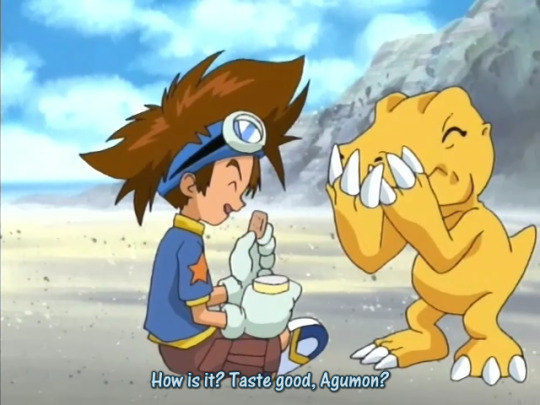
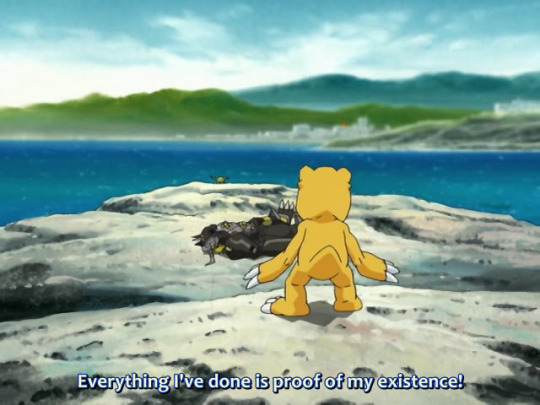
Taichi and Agumon immediately jump to mind as the first among the “like-minded” pairs, especially since the series shows them so often in sync and chilling together. Taichi himself is a straightforward person, so it stands to reason that his straightforward personality would also lend to Agumon coming off as being rather much like him.
However, there is one slight difference between the two, and it’s that Agumon has a somewhat stronger sense of “easygoing chill” than Taichi does, right down to using the more polite boku first-person pronoun in contrast to Taichi’s more assertive ore. He also lacks Taichi’s penchant for mild insensitivity -- in fact, very unlike Taichi, he has an incredible amount of emotional insight (02 spends quite a bit of time in 02 episodes 32 and 46 to showing off Agumon as someone who makes up for all of his lack of intellectual understanding with emotional and borderline poetic insight). And, really, while Taichi is a bit surface-insensitive, and while he seems to be impulsive, he actually is a conscientious person and is trying his best in his own way, and he isn’t the kind of person who cares about societal things like seniority, and he demonstrates multiple times that he’s easygoing and chill, and so you can say that’s a part of Taichi as well. Remembering that a Digimon partner’s presence helps their own human partner grow, Agumon being so openly friendly helps Taichi maintain good relations with others without running afoul of them.
One of Agumon’s most famous traits is that he likes food, which is not actually something that was in the original Adventure or 02 all that much but has been somewhat exaggerated since. That said, back in Adventure, while it was established that all Digimon regularly need food in order to maintain their evolutions, Agumon would usually be the first to complain “I’m hungry,” and whenever they did get food, Agumon would be one of the most prominently enjoying it. Food is, after all, one of the simplest and most universal of pleasures, and there’s a lot of visual framing of Taichi chowing down just as ravenously as Agumon is -- so, honestly, he probably got it from him.
Taichi also speaks a bit about his pain of being separated from Agumon in the space between Adventure and 02, and he directly refers to Agumon as “the other me”. The word “partner” was not actually used very much in the original Adventure or 02, and Taichi is not able to fully elucidate the sentiment of Agumon’s connection to his own self, but he still understands this much and why the loss cuts him so deeply, and by the time we get to Kizuna, it’s presumably why he uses similar language in his thesis proposal to refer to him. (I already covered the circumstances of Agumon’s relationship to Taichi’s existential crisis in Kizuna and how it led to their separation earlier, so I will omit it here for the sake of avoiding redundancy.)
Yamato and Gabumon

This might surprise some people to hear, but I would also pin this as one of the more ostensibly “like-minded” pairs. Gabumon is shy on the surface, but turns out to be quite passionate -- he uses the same assertive ore as Yamato, in contrast to Agumon’s boku, and he demonstrates his capacity for passion and action in that he’s arguably one of the most assertive in the cast. Note his taking initiative against Yamato’s frostbite in Adventure episode 9, or declaring his intent to stay with Yamato even if it means going against the others in Adventure episode 44, or singlehandedly dragging Yamato out of the hole of darkness in Adventure episode 51.
And, of course, Yamato himself is someone who initially seems a little awkward or detached around everyone, but is actually very passionate, so that’s all the same. And because Gabumon himself is so open about communicating with the otherwise closed-in Yamato, Yamato is able to express himself better over the course of Adventure.
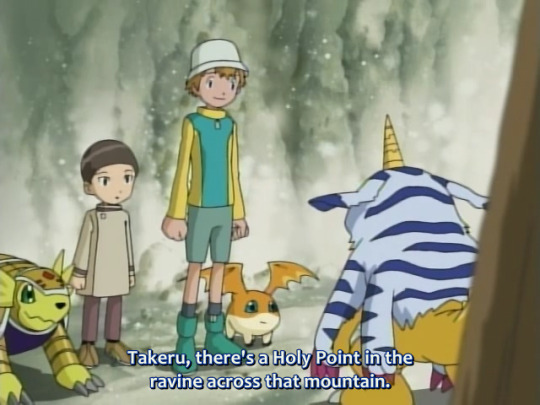
Funny thing about that “shyness”, too -- the idea of Gabumon being particularly shy isn’t present in 02 much at all (we don’t get to see him very much, so it’s hard to say whether it’s completely gone, but it’s at least gone enough for the duration of his appearances). Which is funny, considering: guess who else stopped being shy and became naturally outgoing in 02? Yeah, so, as much as you might hear people (even official!) claim that the Digimon are static while their partners change, that’s not completely true -- the Digimon themselves develop in personality in the same way their human partners do. It’s just more subtle and less drastic, since they’re representing an abstract single part of their personality rather than being an exact match.
Sora and Piyomon
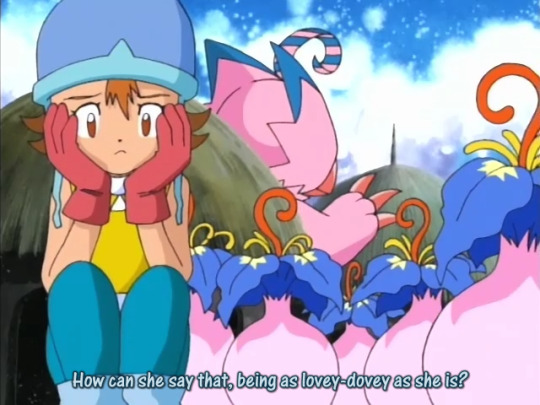
Sora and Piyomon have an interesting relationship in that they’re the only one where their relationship started off on a note of conflict -- mainly in that Sora was very put off by Piyomon at first and even looked down condescendingly on her (well, only for the duration of a single episode). In fact, Sora’s own surface behavior is very different from the kind and caring Sora we know -- Sora dislikes associating with the clingy and affectionate Piyomon for being “mushy”, and even declares that she doesn’t want to “take responsibility” for lugging her around.
Of course, Sora’s character arc later revolves around the fact that she has abysmally bad self-awareness and doesn’t even realize that she has a compulsive sense of responsibility to others. So Sora is affectionate and loving -- she just puts up a front of trying to act a little above that (well, at least, during this part of the series) and doesn’t even see herself as someone capable of being like that (again, purely during this part of the series).
Piyomon is also interesting in that she has one of the most dramatic personality shifts even as early as Child to Adult, where she suddenly switches from the casual atashi to watashi (sometimes even kono watashi, which is super regal), and becomes incredibly dignified and regal even as Birdramon, and you can certainly see why Sora immediately started taking her seriously thereafter. It also begs a lot to think about, considering Sora’s very convoluted character and the many layers of herself that even she isn’t consciously aware of.
The way Piyomon helped Sora shift her own mentality is pretty directly handed to you on a plate in Adventure episode 26 -- because Piyomon played the role of Sora in the metaphor of Sora’s behavior towards Piyomon correlated to Toshiko’s behavior towards Sora, Sora was able to re-adjust her position relative to her family and consider her both someone capable of love, and someone who is loved.
Koushirou and Tentomon
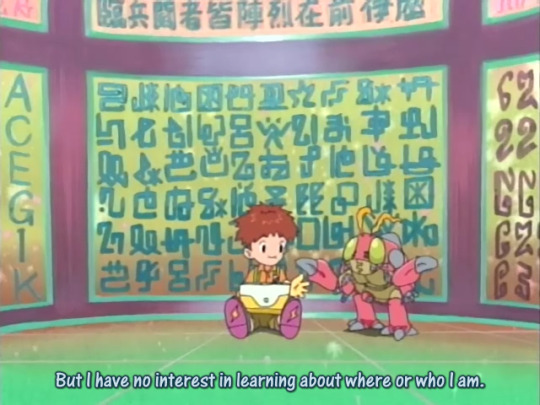
Koushirou and Tentomon are another pair that initially seem like they’re opposing types, with Koushirou being constantly curious and Tentomon being comparatively simple-minded, but the first key to figuring out where the similarity is ends up being a bit deceptive -- Tentomon says in Adventure episode 5 that he’s not particularly interested in himself. And, certainly, Koushirou is interested in Tentomon, but he, too, is not interested in himself -- in fact, he considers himself to be a topic he’d rather avoid instead of looking into everything else.
As far as language goes, while Tentomon does also use the stereotypically easygoing Kansai dialect, he also specifically uses the polite form, mirroring Koushirou’s own perpetual use of polite language. But unlike Koushirou, who uses it to keep distance from others, Tentomon is in fact very sociable, and is even portrayed as a Digimon who’s conscientious of others and “takes care” of them. And because Tentomon is so openly friendly, he manages to coax Koushirou out of his shell and allow him to think about more complicated things related to his own position in the world that he’d been avoiding.
As Koushirou’s character arc proceeds, we learn that he’s polite not only out of distance but also because he really is a very kind person, and moreover that he does eventually want to open up to others. And the payoff for this eventually comes in 02...

...when he ends up becoming one of the most visible members of the older Adventure cast to appear in the series, checking in on the younger kids and developing into someone capable of organizing and managing people. Hmm, seems familiar.
Mimi and Palmon

This one’s an easy one. Mimi is possibly the most straightforward person in the original Adventure cast -- well, that’s the point of her Crest after all -- and so Palmon is almost exactly like her, being a cheerful type who loves being cute. Any contrast between them is only really apparent in the very early episodes of the series, and that’s not even a contrast in theory as much as it’s just something that might intrigue audiences at first when Mimi spent a lot of those episodes complaining, but that’s also mostly because she was heavily under stress, and otherwise Mimi has always been kind and cheerful and indulgent in being cute.
Perhaps the only real difference is that Palmon, being a plant, is more willing to get involved with dirt and other things that Mimi ostensibly would rather not, but as the series progresses, Mimi manages to gain a higher sense of tolerance and get past her initial sense of materialism (which is something she’d had the capacity for the whole time).
Jou and Gomamon

Of the Adventure pairs, this one is probably the one that seems like the biggest contrast on its face, with the overly high-strung and constantly stressed Jou, and the more playful and relaxed Gomamon.
In the end, Jou is someone who’s defined by his desire to support others, and even admits at the end of the series that he’s better suited for a support role than for fighting, and that there’s nothing wrong with that as long as he continues to channel his desire to help people in a way he’s most comfortable with. So, in the end, he’s not actually an inherently aggressive type. And, meanwhile, Gomamon is the kind who’s constantly looking out for Jou, to the point of knowing (such as in Adventure episode 7) when he’s about to do something phenomenally stupid and minding him so that nothing bad happens to him, and so, this is probably why they’re ultimately able to settle down and end the series eye-to-eye (or perhaps hand-to-hand).
And, again, recall that Digimon partners generally reflect a part that’s vital to their own human partner’s growth; considering that Jou is most certainly one of the more extreme personalities in this cast, you get the feeling that he probably needs someone this chill to keep his massive stress tendencies in check.
Takeru and Patamon

Takeru and Patamon are an interesting case largely due to the two of them being so present for a whole two series. In Adventure, both of them seem to be largely like-minded, being playful, innocent, and childish -- although Patamon is more open about expressing the childishness that Takeru keeps trying to cover up. Patamon being roughly on the same playing field (no pun intended) as Takeru means that Takeru has someone he’s willing to be open with and let himself loose a little (such as in Adventure episode 12), because for the first half of the series, he’s almost entirely in the presence of elders and stifling himself for the sake of being “well-behaved”, and it starts his long journey of being able to understand his position and his actual sense of emotions over the course of Adventure and 02.
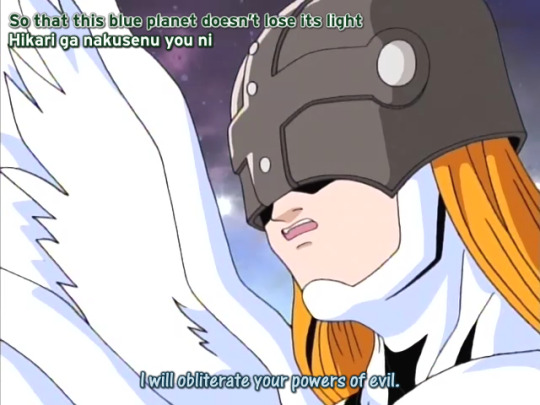
Patamon also has a striking personality change upon evolving, becoming the regal and dignified Angemon, and, interestingly, his appearances have a very “knight templar” vibe where he takes a no-compromise stance against dark forces and states that he’ll condemn all of them to oblivion. This is a stance that’s unnervingly similar to Takeru’s own no-compromise stance against the darkness in 02, and it’s interesting in that Takeru himself had been advocating for pacifism in Adventure episode 12, but this incident traumatized him enough to start taking a position that more resembled Angemon’s.
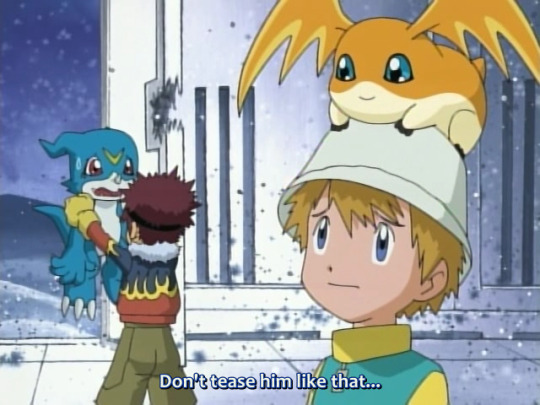
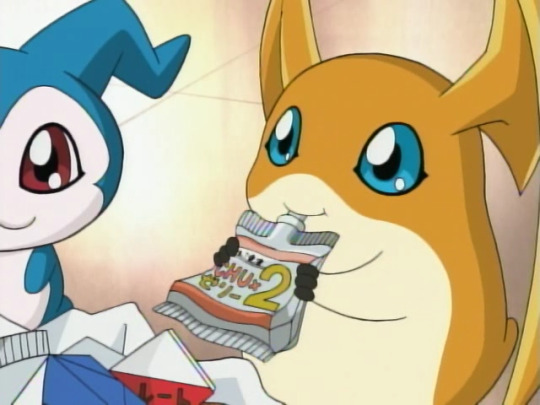
As we go into 02, Takeru’s contrast with Patamon initially seems like an increased mismatch, since Patamon is still ostensibly childish and playful while Takeru is ostensibly more mature. But for one, Takeru’s character arc is about the fact that he’s still pretending he’s more in control of his emotions than he actually is, and in some way you can also glean that there’s a sort of naivete present in his character that he keeps covering up with confident smiles. Patamon, for his part, does actually seem to have adopted a bit of a mentor role to the other Digimon, and we also learn that he’s capable of deliberately trolling people instead of just being generically playful -- much like Takeru himself, who’s a bit evasive and not entirely honest.
We do actually see Patamon reach HolyAngemon in 02 episode 34, but it doesn’t work out well, and while this is partially for plot mechanic reasons, it also says a lot that the “knight templar” stance that both Takeru and HolyAngemon have, with the full depth of no-compromise, isn’t going anywhere, and in the end, something more effective is only possible when Shakkoumon appears in 02 episodes 36-37 -- that is, Takeru is only able to better move on with Iori’s support.
Hikari and Tailmon
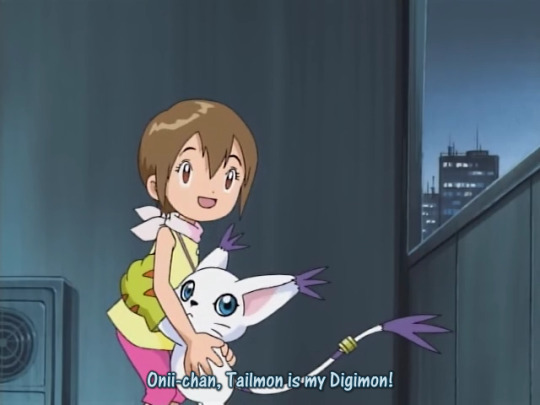
Hikari is the only of the Tokyo Chosen Children to have a Digimon who “defaults” to Adult instead of Child or lower, and it means that Tailmon herself comes with a certain amount of maturity -- on top of having been become a bit hardened due to her experiences being isolated. This is an ostensible contrast to the more pure-hearted and innocent Hikari, but note that Hikari’s own will can be pretty assertive when it comes down to it. On top of that, as much as Tailmon is a bit standoffish, Hikari is also “emotionally isolated” -- she has trouble vocalizing her negative feelings, and it’s difficult for anyone in Adventure or the first half of 02 to truly connect with her internal thoughts. Recalling that the Digimon partner reflects a side of the human partner that’s less easily exposed and allows the human partner to grow in ways they wouldn’t before, Tailmon’s sheer presence gives Hikari a route to action in ways she probably wouldn’t have beforehand.

In 02, Hikari becomes a little more mischievous and playful, and Tailmon also becomes a bit more willing to indulge (she even switches first-person pronouns in sync with Hikari, going from the more polite watashi to the more casual atashi). Both of them are now more able to enjoy themselves more openly. That said, Tailmon still has a certain degree of stuffy personal pride (she snarks at everyone quite easily for fussing over snacks in 02 episode 3), and Hikari herself remains emotionally elusive and repressive at the start of this series.
Tailmon evolves temporarily to Angewomon in 02 episode 13, which is the first time anyone (in this case, Takeru) makes some degree of headway to reaching out to her and allowing her to open up a bit more, but it’s not until 02 episode 31 when Hikari is fully reached out to via Miyako, which marks the first appearance of Silphymon.
Daisuke and V-mon

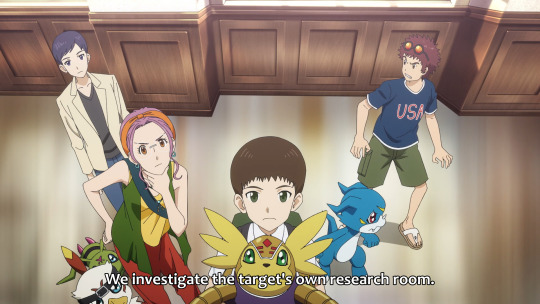
Now here’s a very like-minded pair, even more so than Taichi and Agumon -- and, after all, Daisuke is simple-minded, so painfully simple-minded that he’s practically incapable of hiding anything, and so V-mon is almost exactly like him, down to using the same ore pronoun and being feisty and mischievous (a point is also made that he plays soccer with Daisuke, something that Agumon didn’t necessarily do with Taichi), and, heck, in a rare show of Digimon-Digimon crushes, has a crush on Tailmon in the exact same way Daisuke has on Hikari. (By the time we get to Kizuna and its higher animation budget, a lot of attention is paid to having even their body language mirror each other.)
There is only one real functional difference between the two in disposition, and it’s that V-mon is very straightforward, friendly, and kind, without being prone to getting angry or spiteful at anyone, and in the end, it’s indicative of the fact that Daisuke’s tendency to lash out defensively at everyone is just a front -- at his core, he’s friendly, supportive, and kind. Daisuke’s experiences and banter with V-mon contribute to him getting the sort of validation he needed without having to worry about being on edge or lash out defensively, and because of that, he was able to form a healthier and more supportive relationship with the rest of the group.
Miyako and Hawkmon
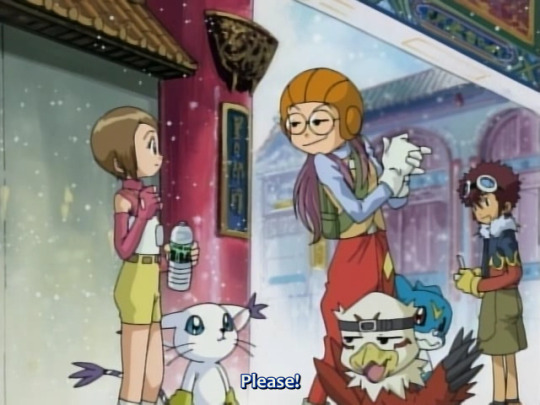
This one seems to be a contrast right off the bat -- Miyako is bubbly, over-the-top, and rather messy and lacking in restraint, whereas Hawkmon is formal, graceful, and polite. But Hawkmon’s most prominent trait is his absolute loyalty and devotion to Miyako -- he’s very often referred to by both official staff and fans as her “knight” -- and is constantly minding her to protect her and make sure she doesn’t go over her head (most prominently, 02 episode 18). And as far as Miyako’s relationship to others goes -- she’s also devotedly loyal to everyone she loves and is constantly going out of her way to help others, and her character arc in itself is about the fact she wants to do her best to reach out to people and help emotionally support them in the best way she can, and Hawkmon managing to channel that to its utmost extent to Miyako in turn (in a very “who watches the watchman?” sense) allows her to regain her bearings and have better control over herself in the aftermath of 02 episode 18.
On top of that, as the series proceeds, it turns out that Hawkmon also shares Miyako’s penchant for dramatic theatrics and being a bit over his head -- even if he seemingly has himself more together than Miyako does, he’s not completely above it all...
Miyako is also the franchise’s first example of a female character with a masculine Digimon partner, and while Miyako herself openly identifies with and indulges in all things hyper-feminine, she also has zero issue engaging in more masculine-associated things as they suit her -- most prominently her Digital World outfit, and the fact she often displays a rather aggressive go-getter and hot-blooded/in-your-face personality that would not be out of place on a male shounen hero in a more conventional show. (Although, as much as these have generally been on the thread of “less visible aspects”, it’s not like this was that less visible of an aspect of her to begin with...)
Iori and Armadimon
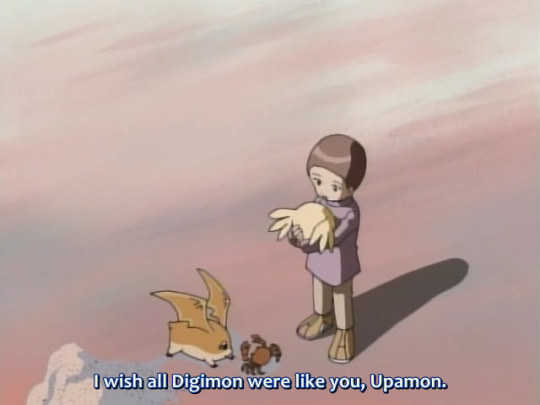
Iori and Armadimon hold the honor of being the only pair in the Tokyo Chosen Children to be voiced by the same voice actress (Urawa Megumi), driving the parallel down even further. And while their surface temperaments seem different, with Iori being rather uptight and strict on himself while Armadimon is laid-back, carefree, and even somewhat assertive, they’re not that different -- Armadimon is basically the curious, impressionable, somewhat childish spirit that Iori would be if he weren’t constantly holding himself back. (There’s a lot to be said about Submarimon going out of his way to take Iori for a ride in 02 episode 16 so that Iori can finally properly enjoy himself for once.)
Iori takes a lot of very stubborn, no-compromise positions over the course of 02, but Armadimon asking just the right kinds of questions allows him to “snap out of it” and be a little more receptive to considering alternatives, or at least taking into account more emotionally-oriented issues he’s dealing with. You can say that Armadimon (especially as Upamon) softening Iori up a bit -- since Iori will never be cold or unforgiving towards his partner, no matter what -- serves as a precursor to Iori starting to question the limitations of his black-and-white view of morality, which allows him to successfully break through to Takeru and fill out the rest of his character arc.
Ken and Wormmon
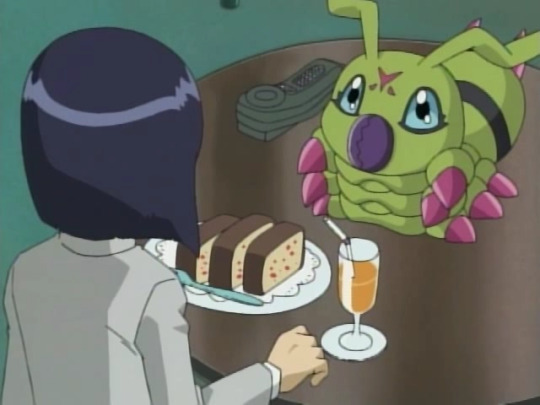
Considering how much of the plot revolved around this one, this one almost goes entirely without saying! During Ken’s stint as the Kaiser, Wormmon represents the heart that Ken’s not entirely willing to leave behind -- and, also, the affection that he’s still craving from his family. The Kaiser going practically out of his way to deny Wormmon yet paradoxically keeping him around is basically his attitude towards his own “weak” and naturally kindhearted self. Notably, recall that the principle of “a Digimon will never deny their partner” applies here -- Wormmon’s “betrayal” of the Kaiser isn’t really any kind of denial, since he was doing it mainly for Ken’s own sake, and, more symbolically, it’s Ken reaching his own limit and coming to realize that this path isn’t what he really wants.
Wormmon is unusually clingy to his own partner over the course of 02, and it’s vital to Ken needing to learn to love himself and also getting important validation that he needs, especially during the critical point in time during 02 episodes 23-30 when he’s still not sure how to approach the rest of the group -- Wormmon gives him someone to talk to honestly and openly, giving him a proper springboard to sort out his complicated feelings about the others and himself. You can say also that as Ken becomes more open and straightforward over the course of the latter half of 02, he, in turn, becomes much more shameless about showing affection and opening his own heart.
Wallace, Gumimon, and Chocomon
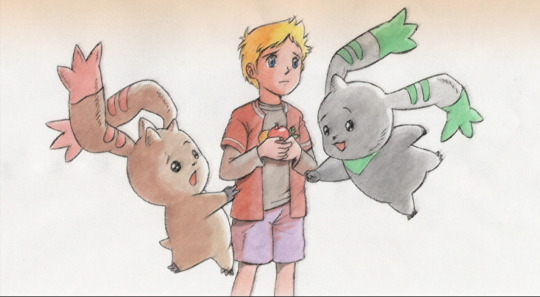
Bonus round!
While it’s hard to fully apply Hurricane Touchdown to this theory (by official admission, it wasn’t properly cross-referenced with the original Adventure/02 series lore, and trying to correlate all of the evolutions in this movie to something metaphorical will give you a headache), Wallace’s two partners still fit very neatly into this overall theory of Digimon partners as a part of the self. Wallace is a character with very sharp duality, trying to be a flirt who asserts himself as a vagrant who’s about to “become an adult”, yet still feels an obligation to keep calling his mom and is engaging in increasingly self-destructive behavior.
Most pertinently, Gumimon and Chocomon represent the two stances Wallace is torn between: wanting to “return to the past” (Chocomon) because he’s still hung up on having lost Chocomon and is convinced that he can make everything just like it was before, and “being able to productively move on” (Gumimon). For most of the early parts of the movie, Wallace is stuck on Chocomon’s mentality of fixating on the past, and Gumimon isn’t even remotely subtle when he draws an explicit parallel between the two (saying that Chocomon didn’t like the heat, followed by offering to give Wallace shade as a hat). But once the conflict escalates and Wallace realizes just how deep in denial Chocomon is, to the point of being destructive to himself and others, Wallace comes to embrace Gumimon’s stance of practicality and moving on. In the end, the ultimate conclusion is reached, and Wallace is forced to fully accept that latter stance when Chocomon dies, but the movie’s ending (and Kizuna) provide an extra option: allowing the past to come back, but in a new form and treading new territory instead of trying to make it “the way it was before”.
#digimon#digimon adventure#digimon adventure 02#digimon adventure last evolution kizuna#kizuna spoilers#qwertyshuman#shihameta#shiha's ask box
204 notes
·
View notes
Note
I must say, you must be one of my favorite South Park meta bloggers! I also think Stan is best boy, and I relate to him so much. I just can’t get enough of your analysis. I’m curious though, why do you ship Style, and what are your thoughts on how the fandom portrays the ship? Style is a ship that means dearly to me. I’ve always found the evolution of their friendship in-canon so fascinating, and I remember how back in the day, Style was literally booming with so much content, but there are definitely some portrayals of the pairing in fan-content that has me feeling “weird”.
Aw thanks!
I do disagree with a lot of Stan (and Style) portrayals. I think the big thing is that Stan or Kyle are probably going to be the two most people relate to, especially if they ship Style. So when they relate to one or the other it comes with inherent biases. Like I relate to Stan much more than I relate to Kyle, so it's easier for me to see his perspective, so it's easier for me to be biased in his direction. I think writing them neutrally is pretty hard for a lot of people, especially when Stan and Kyle have caused each other pain. Because of that I think it's pretty common to veer into one or the other just constantly being a huge dick no one should ever put up with. Instead of what they both are which is just, dicks the way most normal people are dicks. Good people, but fallible.
Stan and Kyle have the potential to be genuinely good for each other. With them fighting/not relying on each other as much, it's easier to forget that they make a good team. And with South Park being as it is, it's also easy to forget they probably haven't been fighting for that long, even if it feels like forever.
I think a lot of their problems come down to the fact that they actually love each other so much that they have a hard time communicating. Stan's been more closed off and telling Kyle less than other friends post-Ass Burgers. Kyle's been more critical of Stan's behavior post-Ass Burgers. And it'd be easy to chalk that up to them just not liking each other anymore, but that's not it. When it comes to Stan being depressed:
Stan's not bringing it up because he's scared if he does, it will make Kyle hate him again, the way he thinks Kyle started to when he said everything was shit. Kyle's not bringing it up because he's scared that if Stan's still cynical, it means Stan (still) hates him the way he seemed to the whole time he was saying everything was shit, because he was one of the things Stan saw as shit. There's a lot of hurt that they haven't brought up with each other. They're kids and they love each other, and they hope that not-talking about it will make it go away like the little rifts they had before did. The problem is that those smaller fights are things that, maybe, they actually could get over on their own without needing to have a whole conversation about it. This isn't. They're pushing each other away, involving each other less, trusting each other less, because they actually don't want to lose each other.
This is the kind of thing I think can get healthier with age, with experience, and even with time apart-- I don't necessarily think that taking a break after the Vaccination Special is bad for them. They're both too close and have too much invested to keep digging at the issue while it's fresh. It's a way for them to grow while apart, but HOPEFULLY come back together in a way that's healthier, after they've really worked out who they are alone.
I like a lot about Stan and Kyle's relationship. When they're operating at their absolute peak, they love each other but still call each other on their bullshit. Or they even don't call it out, and instead let the other figure out that they disapprove without even saying one word about it, and that's enough to set them back on the right moral path. They aren't the same person, they have different goals, different motivations, different flaws and strengths. But they get each other. They love each other. When one's trying to do something and it makes sense, they'll support it even if they wouldn't do it on their own. Because it matters to their best friend.
When one's struggling, they'll try their best to fix the problem, even if it's a problem they wouldn't have, either. They've supported each other through good times and terrible times. They've even in a marriage cliche been there through sickness and health-- Stan's depression has thrown a curve ball due to the toll it took on both of them, but when Kyle needed a kidney, Stan was there. When Stan was struggling with his freemium game addiction, Kyle was there (even AFTER them not being as close as they were before). They can and have helped each other through terrible times that could have put a strain on relationships before.
They want the other person to be the best person he can be, and they in turn want to be a better person for him. They have plenty of things both together and apart that they need to overcome, but they honestly have a very strong foundation. I think as they get older, more aware of their feelings and how to discuss them, and more secure in their individuality as they prepare to leave South Park, their relationship has the potential to be very low drama and very happy.
73 notes
·
View notes
Note
about motherland fort salem: that's good to hear! all i really know about the show is that there's a gay couple who are witches i think? i just didn't want to get involved and then for it to be another clexa type scenario, you know?
A brief history of my experience of F/F pairings on screen:
or, why I understand your fear
and also, why Motherland: Fort Salem gives me hope
I understand your apprehension. I came of age into my queerness in a time when literally. every. single. prominent lesbian movie ended with one or both of the pair either killing themselves or going back to a dude. Apparently that’s all their het producers thought queer women were capable of. And it was just something I came to expect, so I savored whatever sexy scenes I got and threw out the rest—which was mostly overblown Queer Angst™. (And if you know me, you know I love angst, just not angst that constantly revolves around the anguish and trial of reconciling one’s sexuality.)
(Side note: if you’re queer, you know queer angst is real. Coming out to yourself is hard. Coming out to others is hard and sometimes dangerous. Seeing this angst thoughtfully explored on screen can be liberating. But constantly reducing the whole of queer folks’ experience to that type of angst, especially by het folks, can get boring at best or becomes tokenizing at worst.)
Anyways, the next step of the evolution in queer women representation (by mostly het producers) was turning down the Queer Angst™ and recognizing the capacity of queer women for deep and thoughtful relationships. But OF COURSE these relationships were never central to the story and show, so they returned to their tried and true habits of ripping the F/F pairing apart, usually in fairly thoughtless ways. Lexa was the glaring example, but we can all name others. A surprise development in this stage was the discovery of the power of queer-baiting, which het producers have used to powerful effect. See: Supergirl.
We’ve been burned. For years. I get it.
But this is all to say that Motherland: Fort Salem feels different to me. There are a lot of reasons for this.
First, the show makes me feel safe in a number of ways. All of the main cast are women. (It’s an alternative America that is a matrilineal society, and witches make up the military’s power. Men are basically there for supernatural fuel, with a few exceptions.) There is literally not one man who is a main character. Also, this is maybe the most sex positive show I’ve ever seen. Not only is queerness normalized, so are poly relationships and general sexual joy and freedom.
Second, the F/F pairing itself seems solid. Raylla is the first relationship introduced, and they are the main pairing throughout the first season. Raelle is obviously a lead, and you could argue that Scylla is, too. Do they endure some angst? YES. HEAVY ANGST. But none of it is Queer Angst™. There are no struggles of coming out, no hate crimes, no one forbidding their love because they’re both women. It’s not forbidden at all, just discouraged—for other more compelling reasons.
This pairing is a driving force into the second season. I’m not sure if they’ll get much screen time together (because of where the plot has led), but they’re integral to the story—both as individuals and as a pairing—and I can’t imagine either of them being killed off.
I feel good about Raylla. So far, I really trust the writers. And I’m taking all the hope I can find these days.
EDIT: h/t @rivertalesien from whose conversation this sprang (I think).
83 notes
·
View notes
Note
Can’t believe I just saw a (well they don’t say outright that they ship sessrin but they do have “all ships welcome” in their tag) sessrin neutral shipper be like “sessrin can be done right” “antis are just as bad and problematic as shippers” show up in my feed. They complained because they aren’t vocal about anti sessrin they’ve been blocked by creators they like. Like sessrin literally normalizes pedophilia and grooming for actual children but go off about how it “can be well done”
I must have missed this - yesterday, my internet cut out for several hours, which was great for reading, but not so much for keeping up with social networking, or just work in general.
I definitely don't believe that SessRin can be "well done", but I also can't stomach the pairing on a visceral level. I certainly don't look for content in a category that makes me nauseous, so I couldn't possibly speak on the amount of nuance and sensitivity one fanfiction has over another when addressing Sesshoumaru and Rin's power differential. I'm sure there is some, but I doubt I would find any of it "well done" in a way that makes me think it's not exploitative and abusive.
That being said, I don't read much fanfiction of any pairing to begin with, so...
As for whether "antis can be just as bad and problematic as shippers", one side is insisting that it is perfectly fine to romanticize child grooming and the other is reacting to that assertion with some disgust, so the context for the enmity isn't really the same. HOWEVER, I'd like to think I've demonstrated here that criticism of an idea you don't like, or defense of your point of view, doesn't HAVE to be antagonistic. You can absolutely have a civil discussion with someone regarding their difference in opinion. I'm not going to try to claim one side is better or worse than the other, because I frankly just think that obscures the issue at hand. To me, the issue is that SessRin exists not because the people who ship it are bad awful abuse apologists, but because it is a logical interpretation based upon the evolution of similar relationships in media they've seen in the past. We are all a product of our environment and experiences, and as individuals, we don't have a lot of control over what is presented to us as normal and good. Yes, I believe there are UNDOUBTEDLY people in the SessRin community that might try to use it in order to groom younger fans, but I don't think it's the majority, and I think those people should absolutely be condemned and disowned from the community to protect younger fans. But the average SessRin fan? Just some person who is getting defensive and angry over being called a shitty person for just having the most obvious interpretation in the world.
You don't have to like SessRin fans, or think they're good people. You should just acknowledge that this problem is bigger than them and lashing out at them doesn't do much more than make you look like the bad guy who's ranting and raving about the real-world consequences of shipping fictional characters.
I have NO idea if this is what the post you're referring to was getting at - this is just my take on it, and I hope it makes some sense.
#inuyasha#anti sessrin#rin (inuyasha)#sesshomaru#sesshoumaru#anti grooming#response to a post i haven't read#and i'm busier than ever today#so i may not get to any more asks until tomorrow#my apologies friends
8 notes
·
View notes